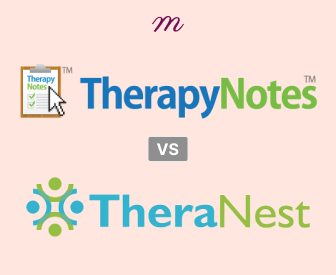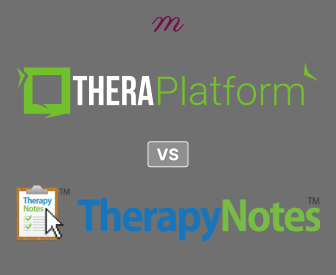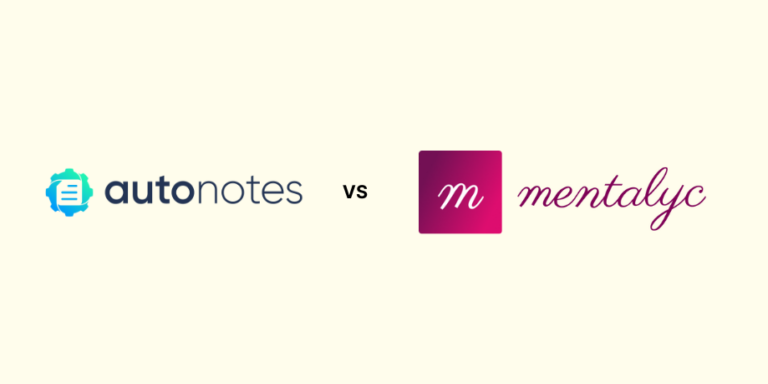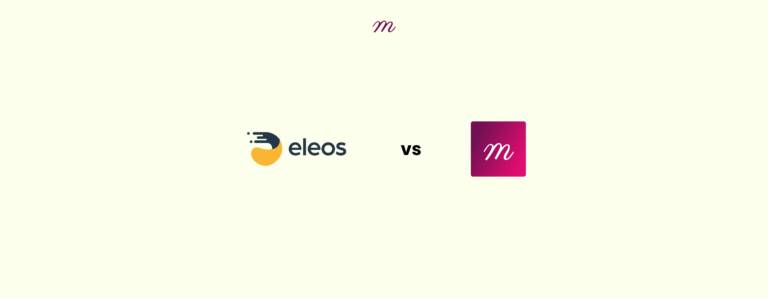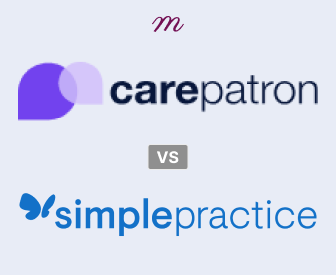Have your progress notes written for you automatically
Comparing practice management software options can help mental health professionals seek efficient ways to manage their practices. TheraNest and TherapyNotes are two electronic health records systems that provide excellent value for the mental health practices.
TherapyNotes offers straightforward efficiency with its core features. TheraNest, on the other hand, includes Wiley integration and also offers an option for fully managed insurance billing. Both platforms offer a range of features designed to streamline the administrative and clinical aspects of running a mental health practice, but they cater to slightly different needs and preferences. This article explains how these EHRs differ in features, customer support, cost, and overall user satisfaction.
Key Differences Between TheraNest and TherapyNotes
While TherapyNotes and TheraNest offer similar services to therapists, there are some general differences in how they accomplish this.
TherapyNotes is better designed and executes its features more effectively than TheraNest.
TheraNest pricing is based on caseload size, while TherapyNotes pricing considers the number of practitioners.
TheraNest has more a la carte pricing, while TherapyNotes includes most of its features under one price.
Features
TheraNest provides comprehensive features, including client scheduling, progress notes, billing and invoicing, a client portal, and telehealth capabilities. Its standout feature is the robust client portal, which allows clients to schedule appointments, access telehealth sessions, and manage their billing and personal information. TheraNest also offers detailed analytics and reporting features, enabling practices to monitor various aspects of their operations, from financial performance to session frequency.
TherapyNotes also offers various features tailored to mental health professionals, including scheduling, psychotherapy notes, billing, a client portal, and telehealth. Its note-taking functionality is highly praised for its structure and compliance with industry standards, making it a go-to for therapists who prioritize documentation and compliance. The scheduling system is another highlight, as it’s explicitly designed for the needs of mental health practitioners, integrating reminders and calendar management in a user-friendly interface.
Both platforms offer the standard and advanced features typical of a mental health EHR. While both include the basics, TherapyNotes is more functional and better designed.
Caseload & Practice Management
TheraNest and TherapyNotes perform very similarly in caseload management, but TherapyNotes takes a slightly more straightforward approach with less flexibility. This helps streamline workflows in the system, simplifying daily workflows.
TheraNest offers more options for creating practice reports, and therapists and staff can be added at no additional cost. This platform is a more capable practice management system.
Documentation
TherapyNotes provides a more comprehensive library of forms, intake processes, and documentation systems compared to TheraNest. TheraNest must also improve its usability issues, insufficient form selection, and significant problems creating custom forms.
TheraNest integrates Wiley Treatment and Progress Note Planners, which can help users develop in-depth treatment plans. Wiley is a highly recognized name in treatment planning, and its products support quick and efficient workflows for everyday paperwork.
Calendar and Scheduling
When evaluating the calendar and scheduling functionalities of TheraNest and TherapyNotes, it's evident that both platforms have room for improvement. These components are essential for mental health professionals who require efficient and reliable systems to manage client appointments, group sessions, and personal schedules.
User Interface and Experience
Both platforms could enhance user interfaces to make navigation and operation more intuitive. Due to cluttered or non-intuitive design elements, users might find scheduling appointments or finding available time slots more cumbersome than necessary.
Customization Options
A notable limitation is the need for extensive customization features. Mental health professionals often need the ability to tailor appointment types, duration, and scheduling preferences to fit therapy modalities and client needs. A more flexible customization capability could significantly improve user satisfaction.
Integration with External Calendars
Integration with widely used calendar systems like Google Calendar or Microsoft Outlook needs to be improved or more seamless. This limitation requires more than therapists' ability to synchronize their professional schedules with personal or other work-related calendars, leading to potential scheduling conflicts or the need for manual cross-checking.
Automated Reminders and Notifications
While both platforms may offer some form of reminders or notifications, the sophistication and customization of these features could be improved. For example, allowing more personalized messages, varied notification methods (SMS, email, in-app notifications), and adjustable reminder timing would enhance client engagement and reduce no-shows.
Reporting and Analytics
Insights into scheduling trends, client attendance rates, and session cancellations are valuable for practice management and optimization. Enhanced reporting and analytics features assist therapists in making data-informed decisions to improve their operations.
Mobile Accessibility
The effectiveness of mobile applications or responsive design for calendar and scheduling features is crucial. Therapists and clients would benefit from more robust and user-friendly mobile access to scheduling functions, enabling easier appointment management.
Client Self-Scheduling
A client self-scheduling feature could offer clients more control and flexibility while reducing the administrative burden on therapists. Improvements include better control over available slots, automatic intake form integration, and clearer guidelines for booking or rescheduling appointments.
Addressing these issues could significantly elevate the overall functionality and user satisfaction with the calendar and scheduling systems of TheraNest and TherapyNotes, making them more competitive with other platforms.
Billing
The billing functionalities within TheraNest and TherapyNotes cater to different aspects of practice management, each with unique strengths and weaknesses. The choice between them depends on a practice's specific billing needs, including how much control therapists wish to have over the billing process and the level of billing support they require.
TheraNest Billing Features
TheraNest stands out for offering complete managed billing services. Practices can outsource their billing process to TheraNest's billing experts, who handle claims submission, follow-ups on denied or partially paid claims, and manage other billing-related tasks. This service benefits practices that prefer to avoid dealing directly with billing complexities and would rather focus on providing care to their clients.
Practices that opt for TheraNest's managed billing services expect reduced administrative burdens, reduced rates of billing errors, and improved cash flow due to more efficient claims processing. However, this level of service may come at a higher cost than self-service options, and practices might need more immediate control over the billing process.
TherapyNotes Billing Features
TherapyNotes provides a self-service billing feature, giving therapists more hands-on control over their billing processes. This feature allows practices to manage billing in-house, from processing payments to submitting insurance claims directly through the platform.
TherapyNotes offers tools that streamline the submission of insurance claims and the processing of direct client payments. This includes features for electronic claims submission, tracking claim status, and managing EOBs (Explanation of Benefits), which can enhance the efficiency of insurance billing.
Self-service billing can be advantageous for practices that prefer to maintain direct control over their billing process or those with a dedicated billing staff. It allows immediate action on billing issues, direct interaction with clients and insurers, and potentially lower overall costs since it eliminates the need for outsourcing.
Comparative Analysis
The choice between TheraNest and TherapyNotes for billing might be a trade-off between cost and control. TheraNest’s managed billing service may be more costly but offers convenience and expertise, reducing the burden on practice staff. TherapyNotes’ self-service billing feature might be more budget-friendly and provide practices with direct oversight of their billing processes.
Larger practices or those with complex billing needs might find TheraNest’s managed services more suitable, while smaller practices or those with simpler billing processes might prefer TherapyNotes's control and hands-on approach.
The decision between TheraNest and TherapyNotes for billing services should be informed by a practice’s specific billing needs, preferences for control versus convenience, and the level of in-house expertise available for managing billing processes.
Telehealth
Telehealth capabilities have become increasingly important for mental health professionals, especially in the wake of the COVID-19 pandemic, which accelerated the adoption of digital health services. TheraNest and TherapyNotes both accommodate these needs but do so in ways that reflect different pricing models and integration strategies.
TheraNest offers a telehealth platform as an add-on feature, which means practices can opt to include or exclude telehealth services from their subscription according to their needs. This a la carte pricing model can be financially beneficial for practices that either do not require telehealth services or only need them intermittently. Practices can tailor their subscription to fit their budget and clinical services model.
TherapyNotes incorporates the telehealth platform within its standard monthly price, offering an integrated solution without an additional fee for telehealth services. This approach simplifies billing and might be more cost-effective for practices that regularly use telehealth services to meet clients' needs. Including telehealth services in the standard package reflects an understanding of the growing importance of remote sessions in mental health care.
Therapists must consider the frequency with which they plan to conduct telehealth sessions. For those anticipating a high volume of remote sessions, TherapyNotes might offer better value. Conversely, TheraNest might be more cost-effective for practices focusing predominantly on in-person sessions but still wanting to offer telehealth as needed.
An integrated telehealth platform can streamline scheduling, session management, and documentation by keeping all functionalities in one place. Practices should evaluate how seamlessly the telehealth features are integrated with other practice management functions.
ePrescription Capabilities
Both platforms provide ePrescription services, though these are available for an extra fee. This feature allows prescribers to electronically send prescriptions directly to pharmacies, particularly relevant for psychiatrists and other prescribers within mental health practices.
Managing prescriptions within the same platform can significantly streamline workflows, reduce administrative burdens, and minimize the risk of errors associated with using separate systems for different tasks.
ePrescription features must comply with strict regulatory standards, including patient privacy and data security. Both TheraNest and TherapyNotes ensure their ePrescription services meet these requirements, assuring prescribers and their clients.
The additional cost of ePrescription services must be weighed against the benefits of integrated prescription management. Practices should consider factors such as prescription volume, the efficiency gains from using an integrated system, and the potential for improved patient compliance and outcomes.
User Interface
TheraNest's user interface is intuitive and user-friendly, designed to be accessible for practitioners with varying levels of tech-savviness. The dashboard shows an overview of the day's appointments, outstanding tasks, and recent client activity, making it easy for users to navigate to the most used sections of the software.
TherapyNotes is known for its clean, straightforward interface, emphasizing ease of use and efficiency. The platform's layout, which is logically organized, allows users to access the different features and functions they need without overwhelming them with too much information at once.
Customer Support
Both TheraNest and TherapyNotes have established themselves through their primary service offerings and the robust support systems they have developed for their users.
TheraNest's Approach to Support
TheraNest offers a wide range of support resources to efficiently onboard new users and ensure existing users have access to the help they need. This approach includes live webinars, which cover a variety of topics, from basic functionality to advanced features. These webinars offer the dual benefit of real-time interaction and instruction from experts.
For users who prefer self-guided learning or need help outside of scheduled webinar times, TheraNest provides a library of video tutorials. These tutorials are designed to be concise and targeted, enabling users to quickly find answers to specific questions or learn new aspects of the platform at their own pace.
TheraNest strongly emphasizes the responsiveness of its customer service team. Users can reach out via various channels, including email, phone, or the platform itself, and expect prompt and effective assistance. The team's responsiveness enhances user experience by minimizing downtime and frustration associated with unresolved issues.
TherapyNotes' Commitment to Support
TherapyNotes offers personalized assistance, so when users contact support via phone or email, they can expect to receive help tailored to their specific situation. This approach can be beneficial in resolving complex issues or providing guidance that directly aligns with the user's practice needs.
In addition to direct support, TherapyNotes provides a comprehensive knowledge base that users can access anytime. This online resource contains articles, guides, and FAQs designed to help users navigate the platform, troubleshoot common issues, and make the most of the platform’s features.
TherapyNotes prides itself on the quality of its customer support team. The platform's commitment is reflected in swift response times to support queries, ensuring users are able to get the help they need. The staff's in-depth knowledge of the platform and the mental health practice landscape allows them to offer relevant and practical solutions.
Both TheraNest and TherapyNotes provide support that helps new users acclimate to the platform and ensures ongoing support for existing users. TheraNest's approach with webinars and video tutorials appeals to visual learners or those who prefer structured learning environments. TherapyNotes' personalized assistance and responsive support may be particularly valued by practices prioritizing direct interaction and swift resolutions to their queries.
The key difference lies in TheraNest's broad array of self-help resources and TherapyNotes' emphasis on personalized, direct support. TheraNest users might appreciate the autonomy and flexibility of self-service options, while TherapyNotes users might value the reassurance of having personalized support.
Both platforms offer strong support systems, but they cater to different preferences in terms of learning and problem-solving styles.
Overall User Satisfaction
Both TheraNest and TherapyNotes have high user satisfaction ratings, but the choice often comes down to specific needs and priorities. TheraNest may be more appealing to practices looking for a robust client portal and detailed analytics. At the same time, TherapyNotes may be the better choice for therapists who prioritize and scheduling and note-taking functionality.
TherapyNotes pros and cons
Pros
A one-month free trial that’s all-inclusive, and no credit card is required.
Excellent user experience.
Telehealth platform is included in pricing and supports up to 16 participants at once.
Easy to learn and quick to implement.
Supports e-prescriptions.
Cons
Customization needs to be improved in some areas.
Poor content selection, such as treatment plan templates, progress notes, forms, and outcome measures.
Limited reporting capability.
TheraNest pros and cons
Pros
Prompt and efficient customer service that includes one-on-one support.
21-day free trial with no credit card requirements.
Customizable URLs, forms, and other features.
Robust training and ongoing learning support.
Great content, including client resources and business guides.
Cons
Limited forms and templates library that’s missing many essential document templates.
Extensive customization may take a lot of time and training.
Caseload-based pricing may become expensive for practices with many clients.
Pricing
TheraNest offers a tiered pricing model based on the number of active clients, making it a scalable option for practices of all sizes. This allows smaller practices to access the platform's features without a significant financial commitment, with the option to scale up as the practice grows. TheraNest pricing varies from $39 to over $91 per month, with the final cost depending on the size of the caseload. TheraNest's pricing is not as straightforward as TherapyNotes. A few standard TherapyNotes features are paid add-ons with TheraNest.
TherapyNotes offers a tiered pricing structure but focuses on the number of clinicians rather than clients. This approach benefits practices with a stable number of therapists but fluctuating client numbers, providing predictable costs regardless of client load. The monthly cost ranges from $49–$99+. It features a simpler pricing model compared to TheraNest. Therapists pay a fixed fee for unlimited access to the platform, with minimal additional charges. Adding more practitioners results in a modest monthly price increase, plus a per-practitioner fee for extra features like telehealth and the client portal.
Which Platform Provides Better Value?
The value TherapyNotes or TheraNest offers depends on the practice's needs. In most scenarios, TherapyNotes offers a better value than TheraNest because It provides a more flexible pricing structure, with all standard features under a single monthly fee.
If the practice has multiple practitioners, TheraNest has no additional per-practitioner cost. However, numerous practitioners usually mean more clients so that the caseload cap will raise the monthly cost. Remember, the telehealth component and client portal are an additional monthly per-practitioner cost with TheraNest. These features are offered standard with TherapyNotes. While the base plan of TherapyNotes is initially just $10 more than TheraNest, additional expenses can make TheraNest significantly more expensive than TherapyNotes over time.
Which Platform is Right for You?
TheraNest provides bundled pricing, meaning more features are included at a standard rate, which can lead to savings for practices with smaller caseloads. TherapyNotes is ideal for solo practitioners or those who prefer to stick with basic features. Ask these questions before deciding on TherapyNotes vs. TheraNest:
What are the necessary essential features?
What is the budget?
How many clients are on the caseload?
Are there multiple practitioners? Administrative staff?
Are sessions conducted remotely or in person?
Billing insurance?
Is a website required for the practice?
TherapyNotes is an excellent choice for clinicians with a small or solo practice or those new to running a practice. The included telehealth allows therapists to start seeing clients remotely without unexpected fees.
TherapyNotes also offers a user-friendly setup, so even new clinicians should have no problem setting up the platform with minimal support. TherapyNotes' support team will be able to handle any issues that arise efficiently.
Solo practitioners will also benefit from the refined workflow offered by TherapyNotes. Since pricing is based on the number of practitioners, solo practitioners can get established with TherapyNotes at a reduced cost. TherapyNotes' streamlined user interface and intuitive client portal features also support operating a remote or telehealth practice.
TheraNest is suitable for clinicians seeking personalized customer support and managing small caseloads. It is recognized for offering some of the best customer support services among mental health EHR systems. TheraNest's optional managed billing program is perfect for clinicians unfamiliar with insurance billing or wanting to avoid billing-related issues.
TheraNest offers significant value, especially for therapists with small caseloads.
Conclusion
In this evaluation, TherapyNotes generally provides greater value than TheraNest across various common situations encountered by mental health practices. TherapyNotes stands out with its superior design and implementation and a pricing model that ensures therapists can access all necessary tools without facing unexpected costs. TheraNest, in comparison, needs a more compelling design and can be more cumbersome.
However, if a practice places a high value on outstanding customer service, desires the convenience of fully managed insurance billing, or operates with multiple practitioners, TheraNest could be the more suitable option.
The choice between TheraNest and TherapyNotes ultimately hinges on the specific needs of the mental health practice or clinician, including the size of the practice, the importance of various features for daily operations, and the monthly budget. Given that both platforms offer free trials, evaluating each firsthand is recommended to determine which platform aligns best with the practice's requirements.


